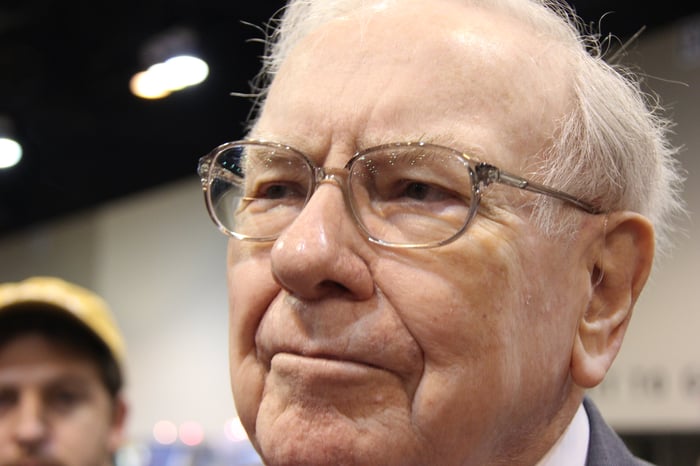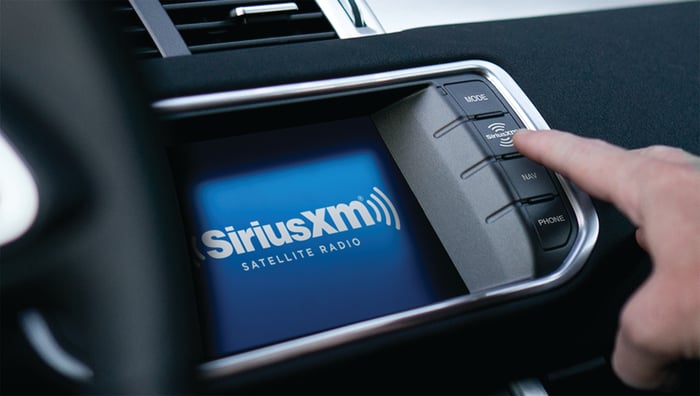|
|
|

|
|||||

|
|
Form 13Fs and Form 4 filings allow investors to track the buying and selling activity of Wall Street's savviest money managers, including Berkshire Hathaway's Warren Buffett.
Following 24 consecutive quarters of purchases, Berkshire's billionaire boss hasn't bought shares of his favorite stock in 13 months -- and there's a good reason why.
However, Buffett can't stop buying shares of a historically cheap monopoly with well-defined competitive advantages.
Wall Street is a stomping ground for wealth creation, and few investors know this better than Berkshire Hathaway's (NYSE: BRK.A)(NYSE: BRK.B) billionaire CEO Warren Buffett.
Six decades ago, the aptly dubbed Oracle of Omaha took the lead role at Berkshire. Under his watch, Berkshire's Class A shares (BRK.A) have rallied nearly 5,940,000%, as of midday trading on Sept. 15. For the sake of comparison, the benchmark S&P 500 has risen by approximately 44,000%, including dividends, over the same 60-year stretch.
Where to invest $1,000 right now? Our analyst team just revealed what they believe are the 10 best stocks to buy right now. Learn More »
Buffett's knack for finding value hiding in plain sight has earned him a huge following -- in case the 40,000-plus people flocking to Omaha annually for Berkshire Hathaway's shareholder meeting didn't give it away. Some investors even choose to mirror his buying and selling activity.
But in a strange twist, Warren Buffett has gone cold turkey on his favorite stock -- a company he's spent approximately $78 billion buying spanning seven years -- and can't seem to stop buying shares of one of Wall Street's few publicly traded legal monopolies.

Berkshire Hathaway CEO Warren Buffett. Image source: The Motley Fool.
Usually, the easiest way to track which stocks the Oracle of Omaha is buying and selling is to refer to Berkshire Hathaway's latest Form 13F filing with the Securities and Exchange Commission (SEC). This is a required quarterly filing for institutional investors with at least $100 million in assets under management. The portfolio Buffett oversees at Berkshire clocked in with a value north of $302 billion, as of this writing.
Investors can also receive updates on buying and selling activity when Berkshire holds a 10% or greater stake in a public company via Form 4 filings with the SEC. All buying and selling activity, including the average acquisition/disposition price, is required to be filed within two business days of the transaction.
But the interesting quirk with Warren Buffett's favorite stock is you won't find it listed in Berkshire's quarterly 13F or its Form 4s. Rather, you'll need to peruse the company's quarterly operating results to see if Buffett has been a buyer.
Just prior to the executive certifications, you'll find a detailed month-by-month breakdown of Berkshire Hathaway's share repurchase activity... because there's no stock Warren Buffett has spent more of his company's capital buying than Berkshire Hathaway!
Prior to July 2018, buybacks were only allowed if Berkshire Hathaway stock fell to or below a price-to-book ratio of 120% (i.e., no more than 20% above listed book value). Since it never fell to this threshold, not a penny was spent on buybacks.
On July 17, 2018, Berkshire's board amended its share repurchase rules to allow Buffett and then right-hand man Charlie Munger to authorize buybacks as long as the company had at least $30 billion in combined cash, cash equivalents, and U.S. Treasuries, and Buffett believed shares were intrinsically cheap.
For 24 consecutive quarters (July 1, 2018 – June 30, 2024), Buffett spent close to $78 billion purchasing his own company's stock and reducing Berkshire's outstanding share count by more than 12%. For companies with steady or growing net income (like Berkshire), buybacks can boost earnings per share (EPS).
But for 13 consecutive months (June 2024 through June 2025), Buffett has gone cold turkey on his favorite stock. The reason most likely has to do with valuation.
Berkshire's billionaire boss is a diehard value investor, and apparently not even shares of his own company are an exception. Whereas Berkshire stock vacillated between a 30% and 50% premium to book value from mid-2018 to mid-2024, it's spent much of the last 13 months at a 60% to 80% premium to book value. Even with Berkshire's cash pile (including U.S. Treasuries) at a near-record $344.1 billion, Buffett has no desire to buy back his own company's stock at the moment.

Image source: Sirius XM.
In addition to not buying shares of his favorite stock, Warren Buffett has been a net-seller of stocks for 11 consecutive quarters, to the cumulative tune of $177.4 billion. Yet amid this persistent selling activity, he has found one stock that he can't stock buying -- and it's a bona fide legal monopoly.
Based on 13Fs and Form 4s, we know the Oracle of Omaha can't seem to get enough of satellite-radio operator Sirius XM Holdings (NASDAQ: SIRI). Buffett oversaw the addition of more than 5 million shares from July 31 to Aug. 4, as well as the purchase of more than 2.3 million shares in late January and early February. All told, Berkshire Hathaway holds around 124.8 million shares of Sirius XM stock, which is good enough for a 37.1% stake in the company.
Warren Buffett is a huge fan of companies with sustainable competitive moats, and Sirius XM delivers. Although it still competes for listeners with terrestrial and online radio, it's the lone holder of satellite-radio licenses. This affords the company a level of subscription pricing power that traditional radio providers typically lack.
However, Sirius XM's biggest edge has to do with its revenue mix.
Most traditional radio operators generate the lion's share of their sales from advertising. While there's nothing wrong with an ad-driven model, things can get dicey for radio companies during economic slowdowns and recessions, which is when advertising revenue can shrink considerably.
Meanwhile, Sirius XM brought in only 19.6% of its net sales from advertising (via Pandora) through the first-half of 2025. In comparison, 76.8% of its net revenue traced back to subscriptions. When recessions inevitably arise, Sirius XM's subscribers are far less likely to cancel their service than businesses are to reduce their marketing budgets. In other words, Sirius XM's operating cash flow tends to have fewer peaks and valleys than its competitors, which is something Buffett can definitely appreciate.
Additionally, Sirius XM has a fairly predictable cost structure. Though talent acquisition and royalty expenses will fluctuate on a quarterly basis, equipment and transmission costs remain close to static regardless of how many subscribers the company has. This adds another level to Sirius XM's operating cash flow predictability.
The final piece of the puzzle with this legal monopoly is its eyebrow-raising valuation. With the S&P 500's Shiller price-to-earnings (P/E) Ratio hitting its third-priciest multiple when back-tested more than 150 years, Sirius XM stands out for its historically low forward P/E of just 7.6.
Before you buy stock in Sirius XM, consider this:
The Motley Fool Stock Advisor analyst team just identified what they believe are the 10 best stocks for investors to buy now… and Sirius XM wasn’t one of them. The 10 stocks that made the cut could produce monster returns in the coming years.
Consider when Netflix made this list on December 17, 2004... if you invested $1,000 at the time of our recommendation, you’d have $662,520!* Or when Nvidia made this list on April 15, 2005... if you invested $1,000 at the time of our recommendation, you’d have $1,043,346!*
Now, it’s worth noting Stock Advisor’s total average return is 1,056% — a market-crushing outperformance compared to 188% for the S&P 500. Don’t miss out on the latest top 10 list, available when you join Stock Advisor.
*Stock Advisor returns as of September 15, 2025
Sean Williams has positions in Sirius XM. The Motley Fool has positions in and recommends Berkshire Hathaway. The Motley Fool has a disclosure policy.
| Feb-28 | |
| Feb-28 |
Stock Market Week: Reaction To Iran, Berkshire Earnings, Apple Event
BRK-B
Investor's Business Daily
|
| Feb-28 |
Stock Market Week: Reaction To Iran, Berkshire Earnings, Apple Event
BRK-A
Investor's Business Daily
|
| Feb-28 | |
| Feb-28 | |
| Feb-28 | |
| Feb-28 | |
| Feb-28 | |
| Feb-28 |
Warren Buffett's successor Greg Abel publishes his first letter to Berkshire Hathaway shareholders
BRK-A
Associated Press Finance
|
| Feb-28 | |
| Feb-28 | |
| Feb-27 | |
| Feb-27 | |
| Feb-27 | |
| Feb-26 |
Join thousands of traders who make more informed decisions with our premium features. Real-time quotes, advanced visualizations, backtesting, and much more.
Learn more about FINVIZ*Elite